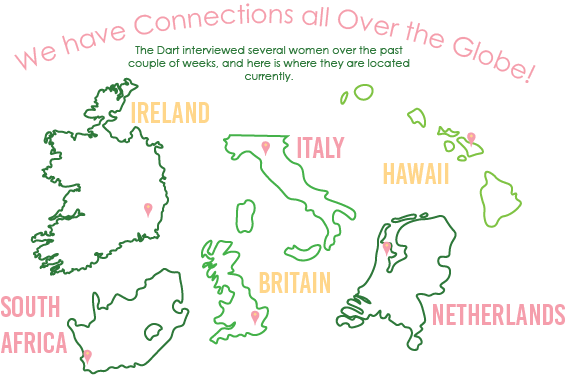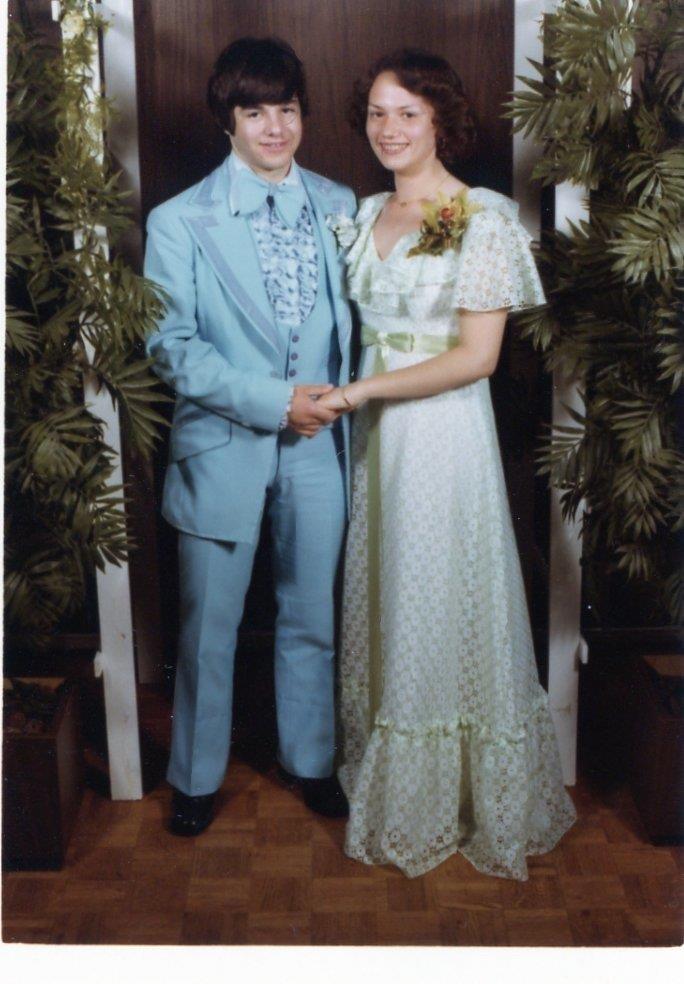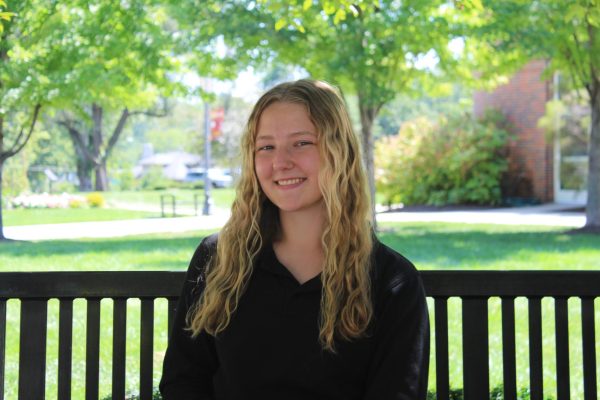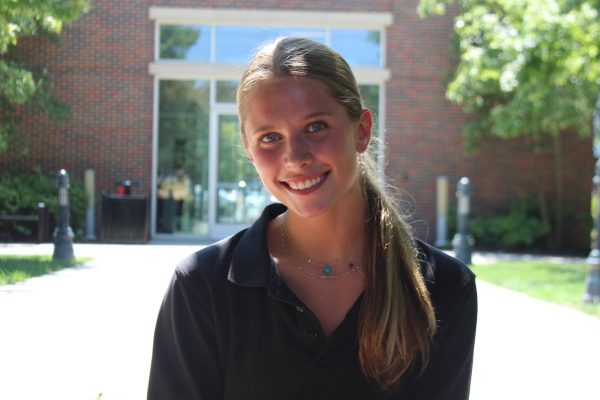In the words of the STA mission statement, “St. Teresa’s Academy educates young women to think critically, encourages them through Catholic values to love the dear neighbor without distinction, and empowers them to change the world.” For many STA alumnae, changing the world hasn’t stopped after high school in KC. The STA community reaches far and wide, boasting alumni all over the world, from Hawaii to South Africa.
Class of 1977 graduate, Eileen Bell, moved to Ireland over 40 years ago after graduating from Rockhurst College, or Rockhurst University as it is known now, to connect with her Irish roots, her relatives who live in Ireland and explore the country. Bell’s father was from Dublin and her mother’s parents were from Wexford and Kilkenny. She did not anticipate staying in Ireland permanently, but after a few months, she ended up staying for good.
“The year I graduated from Rockhurst my sister actually was here and my youngest brother spent the summer here [Ireland],” Bell said. “I came over and I thought I’d stay for like three or four months and I ended up staying for what has been 40 years. Unemployment was really high, and I luckily got a job unrelated to my degree but that supported my early time in Ireland. I hadn’t originally intended on living here for as long as I have. But look, it has been a great experience.”
Bell works for Enterprise Ireland, the Irish government agency that invests in and works with indigenous industry assisting those businesses to grow globally. Her business advisory role encompasses being the Digital Entertainment sector lead, so she works with a lot of TV film, animation, VFX and AR/VR immersive technology companies. With a focus on international markets, Enterprise Ireland has 40 offices around the world and she has been able to travel overseas for work across many countries.
“My career initially began when I was able to get a job with the Irish Trade Board, which merged with another Irish government agency to become the organization I work for now. I did a stint overseas in our office at the World Trade Centre in Amsterdam, Netherlands,” Bell said. “And that was very interesting. So working for a big organization like Enterprise Ireland is great, presenting lots of opportunities to do many different things. And I have found that very, very good and rewarding.”
Bell is close with her family, some of which live here in the United States, and some who live in Ireland. She says her favorite part of living in Ireland is being close to family, Irish culture and lifestyle.
“I’d have to say my family here: my sister, her two daughters and my cousins,” Bell said. “I’m close with my cousins and that’s one of the big reasons why I’ve stayed. Another reason I stayed is because I love my job and I think I have made a positive difference with some Irish companies.”
Since some of her family members live in Dallas and Kansas City, Bell has been able to maintain a connection to STA and some of her lifelong friends that she made during her years here.
“I see my friends in Kansas City regularly as I come back to the US a couple times a year. I think it’s important to nurture those relationships,” Bell said. “You know, we’ve shared so much and all the tales from St. Teresa’s. Those were formative years in my life and it has really shaped me into who I am. A lot of things that people work hard at now around inclusion, diversity, corporate social governance and business ethics were lived during my time at STA. Helping others, respecting all, exploring new opportunities and doing good, those things were always present.”
Helen Wheatley (Class of 2017) has now been living on the island of Maui in Hawaii for almost four years after moving there post-college after she studied in San Francisco. For Wheatley, moving to Hawaii was unexpected, but she was drawn to the adventure it provided in a COVID-19-infected world.
“I’ve always had that travel bug and Hawaii felt like the closest I could get to seeing a bigger part of the world while being in the US because of COVID,” Wheatley said. “I was like, ‘Okay, I’ll go out there for six months, maybe a year max. And then I’ll come back to San Francisco and get a real job and figure it out.’ And that was almost four years ago.”
Despite not originally planning on staying in Maui, Wheatley was drawn to the sense of community and lifestyle of the island.
“I felt more at home here in those six months than I ever had in San Francisco over three years, and I was like, ‘This is what it should feel like,’” Wheatley said. “I was feeling settled, and despite nothing being planned at all I felt so calm in this space and on this island and I was discovering these things about myself that I just loved.”
Since moving to Maui, Wheatley said the change of pace has made a difference in her life and helped her on her path of self-discovery.
“I just felt like it was time to slow down and get to know myself a little bit better honestly,” Wheatley said. “And when I got here, I realized what an amazing place it is to do that and to not have a plan for the first time ever felt okay here, because I was surrounded by nature and the community here of young people doing what I’m doing is strong and tight, and I was welcomed into it immediately.”
Since her arrival on the island, Wheatley has worked her way through a series of jobs to create a career. She currently works in tourism boating, leading snorkel trips, whale watching and sunset sails. With her extra time, Wheatley works for Global Empowerment Mission, a non-profit organization that is currently helping people displaced by the Lahaina fires to find housing.
“I’m working on our rental assistance program,” Wheatley said. “There are about 8000 people who were displaced by the fires. Those fires happened about six months ago, so since then, the immediate response from the Red Cross was to move people into hotels because we have so many resorts and hotels here on Maui. And so the vast majority of those people moved into hotels, but that was always meant to be a short term solution. So the program that I’m working on finds long term housing for people, and we’re doing that by converting vacation rentals into long-term rentals. So we’re housing people in Airbnbs for six months to a year, and we’re working specifically with a population that’s not eligible for support from FEMA.”
Although she loves her life, Wheatley acknowledges the fact that it is far from perfect, despite what some may assume.
“One thing that I experience a lot is this kind of assumption that because I live in Hawaii, my life must be perfect,” Wheatley said. “My life is my creation and I love my life. And I have a really beautiful one, but it’s still life…just because I live somewhere beautiful doesn’t mean that I don’t have just as many problems as other people do.”
Her advice to anyone who is interested in moving to Hawaii includes being ready to accept what the island is willing to offer.
“Just come into it with an open mind and open heart and be prepared for change,” Wheatley said. “We say something in Hawaii, which is that usually after the first six months the island will accept you or reject you, and you will know…I’ve seen it happen to many people where things just don’t work out…you have to be open to receiving what the island is ready to give you.”
Molly Hirner (Class of 2021) has utilized her college summers to jetset around the world. After her freshman year of college, she spent a month in London and last summer lived in Cape Town, South Africa, for two and a half months. This summer she plans to spend time in Waterloo, a city in the Ontario province of Canada.
“I’ve always known that I’ve wanted to go abroad as much as possible,” Hirner said. “I’m going abroad again this summer, and I want to move abroad hopefully for a little bit.”
While living in Cape Town, Hirner interned at The Institute for Justice and Reconciliation, which emerged post-apartheid to try to heal the rift in the country. Since then, they have adapted to also address environmental justice and women’s rights, among other causes.
“I mainly helped on their land projects and their women’s rights projects,” Hirner said. “I did a lot of governmental work with them because they were working with the government on a project about land redistribution from the government back to the indigenous people who lived on that land.”
While not at her internship, Hirner took time to experience the country.
“I was able to go on a three-day safari outside of Cape Town,” Hirner said. “We stayed in these different little houses that were small and really cool…They told us all the history behind the land.”
She also enjoyed experiencing the food of South Africa and remarked on the country’s natural beauty.
“I think Cape Town is the most beautiful place ever,” Hirner said. “It has the ocean right there and then also has insane mountains all around you.”
As an experienced traveler, Hirner knows many people are concerned about price when considering spending time abroad.
“You don’t need to break the bank to move abroad,” Hirner said. “There are many creative ways that you can do it…especifically for college students, [there are] so many scholarships at your home university, or outside of your university…a lot of times you can find opportunities that make it a lot cheaper.”
Hirner believes that her time abroad has shaped her, and that it would be a worthwhile experience for anyone.
“I think it’s really important to learn how to be independent,” Hirner said. “I grew up a lot while I was abroad…I’ve enjoyed it so much and learned a lot about myself, and been comfortable being by myself and spending time alone…you also get to see so many cool places and meet so many cool people.”
For the past two years, Katie Tampke (Class of 2014) has lived in the city of Utrecht in the Netherlands. She moved there with her husband after he got into graduate school, and works as a freelance project management consultant and an immigration consultant. She originally was drawn to her field after witnessing the Ebola pandemic.
“I was really interested in emergency response work,” Tampke said. “That started in college, when the Ebola epidemic was going on in Africa and was starting to show up other places in the world, and there had to be these massive responses…I wanted to be part of the group of people that would go and help during these pandemics and be a part of that response team. I just felt like a deep calling towards that.”
She transitioned to general management consulting after experiencing burnout in her role in epidemic response during COVID-19. After moving to the Netherlands, she decided to work as a freelance consultant, which allowed her to secure a visa.
“I found a visa that allows you, if you’re an American, to come and live and work in the Netherlands if you are self-employed,” Tampke said. “It’s called the Dutch American Friendship Treaty visa. So I’m on that visa here and it just requires me to be a freelancer or have my own business.”
Tampke mainly works with clients based in the US, and so she has had to learn how to manage a seven-hour time difference.
“In the Netherlands, my mornings are very free because everyone else is still asleep that I work with,” Tampke said. “So my workday is really more like 11:00 to 7:00 PM rather than 9:00 to 5:00…I do a lot of my errands in the morning…or any type of personal activity…my afternoons and evenings are more busy with calls and the general work.”
The decision to move to the Netherlands was not always an obvious one for Tampke: originally she had considered living in Norway.
“I did all of my masters at KU and then the last class that I took was actually abroad at the University of Oslo in Norway,” Tampke said. “I just absolutely loved it. I was in Norway [over the summer]. It was beautiful.”
Although perhaps not the original plan, Tampke has adapted to life in the Netherlands and enjoys many aspects of life there.
“The healthcare is a lot cheaper and more convenient,” Tampke said. “The way the healthcare system here works is that your primary care provider is allocated by your zip code…This is a way for them to make sure that everyone gets served equally.”
She also loves the convenient public transportation and the biking culture.
“There are more bikes in the country than people,” Tampke said. “Most people have two bikes. They have the bike that they ride to the train station to go to their job, and then they have a bike waiting for them at the other train station that they ride to the building where their job is.”
While some stereotypes may ring true, Tampke suggests that others are false.
“Everyone assumes that the taxes are super high and my healthcare is free,” Tampke said.
She also denied the classic Europeans “only work until noon” perception.
“Work-life balance is better here,” Tampke said. “People rarely work more than 40 hours a week and most of the time they work closer to 37. [But] they still work a full work week and everything runs very smoothly here…just because people aren’t overworking themselves doesn’t mean that things aren’t happening.”
An adjustment Tampke has had to make during her move is speaking Dutch. While most Dutch speakers in the Netherlands also speak English, Tampke has taken strides to respect the country’s culture. This included using a program which utilizes tapes prior to her move, as well as taking classes upon arrival.
“They use the same methods that American diplomats use when they’re educating someone that needs to learn a language really quickly,” Tampke said. “You learn a new language the same way you learn a language as an infant.”
Tampke also pays homage to the role STA played in shaping where she is now.
“It shaped me to not consider my gender when wanting to do something,” Tampke said. “You go to St. Teresa’s and it’s such a formative time in your life, when you’re 14 to 18. That’s when you’re learning these habits and learning self-esteem, and learning how you view the world in so many ways. It’s nice being in an environment that’s sheltered away from the toxic masculinity that you can find in other places.”
For those who want to move abroad, Tampke suggests joining a structured activity to meet people and acclimate to the culture.
“When you’re in a structured activity, you have to go there once a week for a certain amount of time,” Tampke said. “You have to have forced interactions with these people and sometimes that’s good. Sometimes that’s bad depending on who you’re stuck with, but it gives you the opportunity to forge these relationships…you’re doing an activity [where] you have a shared experience with these people, so then you have a reference point to build on that social relationship.”
She also recommends acknowledging the struggles that come with living abroad.
“The first year is going to be really hard,” Tampke said. “Just know, it’s not going to be easy until at least after your first year, at least in my experience, and I’ve heard that from a lot of other people as well. It just takes that long to feel at home someplace, to feel better about the language [and] the culture, to understand your routines and your place, and…to build a social network to feel stable.”
Elizabeth Meyers, a 2009 graduate, moved to London after she saw a job opening from her company. After STA, Elizabeth went to college at the University of Kansas, where she majored in finance and minored in dance.
“So I first started working at Chubb, which is an insurance company and I worked there for six years,” Meyers said. “Then, I started working with Liberty Specialty Markets in Chicago for maybe three and a half years. I saw there was a job opening in London with my company and I just expressed interest in the position to my boss. I got really lucky that I had a boss who has traveled and lived internationally, too.”
Meyers has lived in London for over a year now, and she has adjusted to a different country. She has settled into a normal routine, where her life is not as different from her life in the United States.
“I think people assume it’s just all fun and all travel,” Meyers said. “I think it has been really interesting to have a normal life and find new routines, like finding a grocery store and a yoga studio that I like and friends over in a new place. I have settled into a normal life in a place that feels very different. I am constantly interacting with people who just had a really different upbringing than I did. It’s really eye -opening and I think I’ve grown a lot from the experience.”
Meyers has been trying to find a healthy balance between home and London and trying to prioritize herself, as well as her career, while still staying close to lifelong family and friends.
“I think when I first moved, I felt like I wanted to have it all in both places,” Meyers said. “And you just quickly realize that you kind of have to exist where you are and then try as much as you can to keep up those relationships at home that are most important to you. So it is just a constant balance.”
Meyers also stays connected to STA through family, as her youngest sister, Mary, is a sophomore at STA currently.
“My mom went to school and graduated from STA,” Meyers said. “My sister, Anna, graduated in 2012 and my sister, Mary, is a sophomore at STA right now. I think Mary still being at STA makes it more relevant for our family. I think the all-girls’ environment was really empowering and helped build a lot of confidence in me. I felt really prepared for school when I went to college and those kinds of things just build on each other when you get older and it has carried into my job.”
Meyers believes opportunities in college can transition well into long-term plans for living abroad.
“I think a really good first step, if you have the opportunity to, would be to consider studying abroad in college,” Meyers said. I think that kind of gives you a taste of what it means to be in a new place away from home where people have totally different viewpoints or different perspectives or a way of living. So I always tell Mary and Matthew, my younger brother, they should consider doing that. I would also say that you should think about studying a language. I know STA has you study one throughout high school but I always wished I studied a language as a double major in college. Because I think that’s such a useful skill later. And it’s so much easier to learn it when you’re young.”
Class of 2020 graduate, Thais Montagner, has been living in Florence, Italy for the past year working in fashion and completing college online for an advertising degree from the Fashion Institute of Technology in New York. She is familiar with living in Europe, as she was born in France and traveled there many times.
“Living in Europe wasn’t really new and [it was] something I knew I wanted to do,” Montagner said. “Typically, with the average university for studying abroad, they do it for a semester, but I always wanted to do it for a year because one semester for me isn’t enough. You don’t get enough time to really enjoy yourself in a new country and really spend your time there [Florence] and meet people. So I decided to do it for a year. I think fashion wise, it makes total sense. It was one of the fashion capitals specifically as well as Milan.”
Montagner has always been interested in fashion and that form of self expression. She has been able to see how many types of people dress, as she has lived in Kansas City, Paris, Florence and New York.
“The difference between wearing a flat or heel can make you feel a completely different way,” Montagner said. “So in that sense, I really liked it, but personally, it’s also the business aspects because I’m not particularly the creative person. So I really wanted to be on the more numbers side of fashion as opposed to the design aspects or the styling, if you will…I think also seeing how fashion evolves in different cities was also something that really interested me growing up between New York and Paris as well as Kansas City, seeing how people dress and how different it is is also something I put a lot of weight on when I decided on what I wanted to do in my career,”
Montagner is fluent in English and French and now she is in the process of learning the Italian language.
“I think because I grew up in the States, but also, since French was my first language, it got really confusing and I kept having to actually relearn my first language, which is something that’s a very uncomfortable feeling,” Montagner said. “I actually had to relearn French basically every time I would go back to France. I had lost it because I had not been speaking it as often. So relearning that language really made me kind of start to like to analyze the differences between expressing yourself in a certain language and how different it is. So Italian for me is not, I don’t think, entirely complicated, especially since linguistically, it’s very similar to French,”
Since moving to Italy, Montagner has been able to create new friendships and grow a relationship with her cousin, who lives in Milan.
“I think my favorite thing about Florence is integrating myself with Italians. My cousin is from Italy,” Montagner said.“She grew up in Bologna and she lives in Milan now, so I’m in contact with her and I become friends with a lot of her friends. I think Italians are incredible people and they’re fun to talk to. Really, really easy to talk to…and I think that’s kind of my favorite part.”
Whether on an island in the Pacific or a small country in Europe, spending time abroad offers new and valuable experiences.
“I think you learn a lot also through traveling and experiencing new places and new cultures,” Hirner said. “That’s something that you can’t necessarily learn in the classroom. I think it’s really important to have a global education and experiences.”








